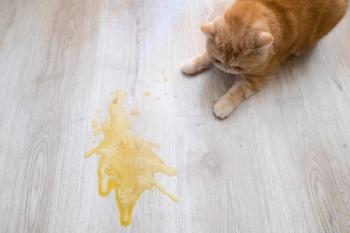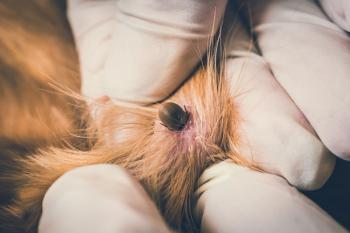
- dvm360 December 2019
- Volume 50
- Issue 12
AAFP releases new feline zoonosis guidelines
The feline-focused veterinary association has released its new feline zoonosis guidelines as well as a client brochure titled What can I catch from my cat?
The American Association of Feline Practitioners (AAFP) this month released new guidelines for feline zoonoses as well as a free client handout on the topic.
The
The guidelines cover enteric zoonoses; scratch, bite or exudate-exposure zoonoses; ocular and respiratory zoonoses; urogenital tract zoonoses; vector-borne zoonoses; and lessening the risk of zoonotic transfer of disease from cats. The client brochure discusses how zoonotic organisms are spread, provides examples of potential cat-associated zoonoses and discusses how to decrease risk to a cat owner.
To lower risk of feline zoonoses, the brochure recommends that cat owners involve veterinarians and veterinary practices by:
- Bringing sick cats to the veterinarian for diagnostic tests and treatments
- Bringing healthy cats to the veterinarian for annual physical checkups and wellness visits
- Administering the optimal internal parasite, flea and tick products recommended by the veterinarian to all cats
- Discussing human-related healthcare concerns with the veterinarian, who can help liaise with physicians.
A panel of veterinarians and physicians worked together on the new guidelines, which build on the AAFP's Feline Zoonosis Panel Report from 2003 and a panel report on feline bartonellosis in 2006. The recommendations of the panelists are based on published data when available, and recommendations of other public health affiliated groups were taken into consideration, according to a release from the organization.
Endorsing the new guidelines are the executive board of the World Small Animal Veterinary Association as well as the International Society of Feline Medicine. The document was also reviewed by the board of the Companion Animal Parasite Council.
Articles in this issue
about 6 years ago
FDA approves longer-lasting feline preventiveabout 6 years ago
Speaking their languageabout 6 years ago
Just approved: Generic clomipramine for canine separation anxietyabout 6 years ago
Talk about birthing pains!about 6 years ago
Economic trends in veterinary medicineabout 6 years ago
How cannabidiol is changing the pet treat industryabout 6 years ago
IDEXX CEO Jon Ayers stepping down after 17 years with companyNewsletter
From exam room tips to practice management insights, get trusted veterinary news delivered straight to your inbox—subscribe to dvm360.




